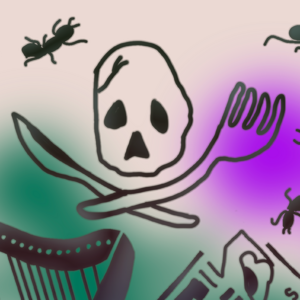Culinary Piracy (or how to steal recipes)
| Culinary Piracy (or how to steal recipes) | |
|---|---|
| Name | Culinary Piracy (or how to steal recipes) |
| Location | Het Wilde Weg |
| Date | 2024/07/18-2024/07/22 |
| Time | 14:00-17:00 |
| PeopleOrganisations | Job Santé, Jelle de Rijk |
| Type | HDSC2024 |
| Web | Yes |
| No | |
Culinary Piracy: Creating a toolkit for stealing recipes is a workshop that in collaboration with its participants aims to develop a toolkit that is useful in unveiling and ‘pirating’ culinary recipes. As such Piracy for the culinary is about questioning the ownership of recipes, flavors and smells. What does it mean to own a recipe? Can you own a recipe? And what does it mean to work with recipes of others? Can you steal (pirate) recipes?!
Tales of grandmothers' recipes that have been passed down for generations, the risotto that is the best at this specific restaurant because of their master-chef, or that secret ingredient you always add to your soups so they become your own. When we are looking to make something but we just don’t know how, we can browse cookbooks, do a little run on the internet or ask the people around us for the right tricks. Ownership seems to always be somewhat embedded in the act of cooking by the book. Within this workshop we will be questioning the ownership of recipes through pirating them. By looking at what is needed to steal, tweak and maybe even write new recipes, this workshop will shed a light on what it means to use them. More then just instructions for a dish, they might be considered treasures full of stories, histories or just simply, text stuffed with good flavour.
- duration: 7 hours spread over 2 days
- number of participants: aprox. 20 - 25
- what do participants need to prepare: We would like for each participant to submit a recipe for us to use in the workshop. It would be great if a certain recipe speaks to you because of a personal memory or feeling. Just liking a recipe for its taste is also a great reason to submit it! Kitchen safe clothing is also encouraged: No open-toed shoewear and long pants are preferred. It is also encouraged to bring clothing that can get dirty, e.g. an old shirt.
Job Santé: Cook, food researcher, VJ, barista, writer, front-row dancer, metabolism enthousiast, phosphorus lover.
Jelle de Rijk: cook, philosopher, party-dj, guitar-slacker, co-conspirator, AI-epistomologist. Activity topic
